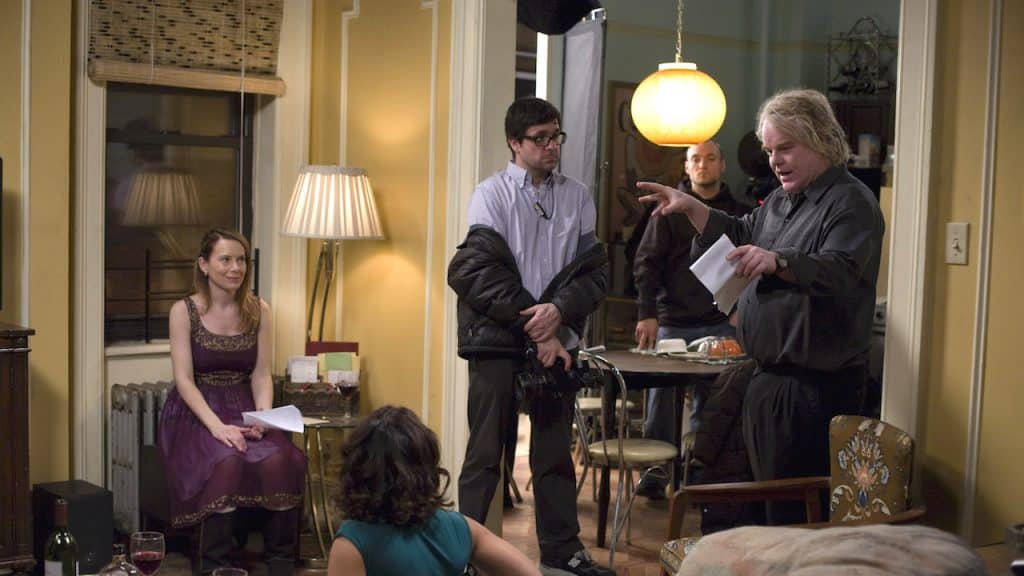Before he passed away at the age of 46, Philip Seymour Hoffman starred in 52 feature films. Starring roles, character pieces, chameleon work—he left a legacy nearly unmatched in both quality and quantity. Now, with P.S.H. I Love You, Jonah Koslofsky wafts through the cornucopia of the man’s offerings.
While he’s lauded by many (including this column itself) for his work on-screen, I think Philip Seymour Hoffman himself cared more about theater. After co-founding the Labyrinth Theater Company in New York in 1992, he’d go on to direct seven on-stage productions. Even as his career on film continued gaining momentum through the early aughts, he never took too much time away from stage acting – just look at his bevy of Tony nominations. Friends generally agree his work in Mike Nichols’ 2012 production of Death of a Salesman took a serious toll on the actor’s mental health.
P.S.H. I Love You will be perpetually incomplete: there’s no way for me to attend, experience or appreciate Hoffman’s stage work as either actor or director. But his directorial debut, Jack Goes Boating, provides something close: for the first time, I can talk about Philip Seymour Hoffman’s filmmaking (as well as his performance).
Hoffman’s only excursion behind the camera wasn’t exactly a trip into uncharted waters. Jack began as a playbill written by Robert Glaudini, a production Hoffman starred in (but did not direct). The film adaptation was also written by Glaudini, with Hoffman again playing Jack alongside John Ortiz and Daphne Rubin-Vega, who also acted in the stage version.

I wonder how much their performances evolved under his direction – or if his own changed significantly. Hoffman’s Jack is a lonely limo driver. He wears a few dreadlocks in his blond hair and a deep love for “Rivers of Babylon” – when his best friend Clyde (Ortiz) asks if he identifies as a Rastafarian, Jack claims he doesn’t. He lives in his uncles’ basement (a setting we never see), chauffeuring the wealthy around Manhattan. Jack’s seemingly content with his stable, solitary life.
Clyde and his wife Lucy (Rubin-Vega) have other plans: Lucy’s friend from work, Connie (Amy Ryan), seems like a good match for Jack. The couple arranges an evening for the four to “hang out.” Their cramped apartment dinner-party feels textured and lived-in, Hoffman’s wide-shots recalling a stage without imitating one. As with the casting, there’s a sense of “if it ain’t broke…” that makes Jack Goes Boating both successful and safe.
Two lost souls, Jack and Connie make plans to see each other again and go boating in the summer. If only Jack knew how to swim. Clyde immediately offers to teach him – he’s a shockingly good friend. A little later, when Connie tells Jack that no one has ever cooked for her, Jack decides to become an amateur chef as well. His self-improvement takes up most of the sparse plot – the only pots boiling are those Jack has set on the stove.
As this awkward, would-be gentleman works to better himself and begin this relationship, the dynamics of Clyde and Lucy’s marriage slowly take focus. They’ve been together for decades, their mutual resentment expressing itself in the form of multiple affairs. Yet the pair appear committed to each other.
For the first time, I can talk about Philip Seymour Hoffman’s filmmaking (as well as his performance).
Hoffman’s richest material comes whenever he’s not on-screen, or at least not a scene’s subject. Jack’s just not particularly compelling – Clyde, on the other hand, is a twisted knot of numbed self-loathing and insatiable desire, held together by Ortiz’s deep sympathy for his plight. It’s unclear how much Clyde is to blame for alienating his spouse, but Ortiz makes his impossible urge to win her back both compelling and sympathetic. Rubin-Vega plays things a bit more distant, but her exhaustion communicates more than just a façade. She’s living some sort of sunk cost fallacy – being honest with Clyde would be too high a price.
Watching one relationship disintegrate while another begins was clearly the fuel of this play, though at a brief 91-minutes the film’s central relationship – between Jack and Connie – feels undercooked. Of the four characters, Connie gets the short straw, her dysfunctional psychology merely presented instead of explored. And while Hoffman’s sensitive and reserved performance fills in some of Jack’s less clear elements, I still didn’t have much invested in his growth, or lack thereof. It feels like Jack has already made peace with his loneliness. What’s driving him to change? With Connie so underwritten, it’s tough to determine why he wants her – or visa-versa.
The direction is certainly competent, with Hoffman making a few ambitious visual choices. During an intimate scene between Jack and Clyde, he points his camera at the windshield instead of his character’s faces; later, he attempts to blend two different frames together to visualize Jack’s learning to swim and cook. Nothing’s groundbreaking, but at least over the course of adaptation Jack Goes Boating picked up some cinematic flair.
All in all, Jack Goes Boating is fine. It’s not a knockout debut, but it should’ve been the first in a long line of films Hoffman would helm (just a few days before he passed, Hoffman’s second project behind the camera was announced, a 1920s drama starring Amy Adams and Jake Gyllenhaal). Six months ago, I wrote that Capote potentially revealed more about Philip Seymour Hoffman’s psyche than even its subject’s. As far as I can tell, you can’t say that about Jack Goes Boating. Maybe it was unfair for me to hope this movie would. Maybe Hoffman saved it for the stage.